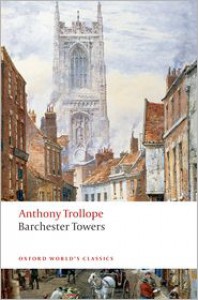Barchester Towers, Barchester #2 by Anthony Trollope

As amusing as it was to read, 'The Warden' was a straight-faced prelude to this extravagant romp through the parlors of the Anglican gentry. One should read the two together as the question of Hiram's Hospital and the wardenship are prime concerns in the greater game being played for control of the diocese of Barchester. It is debatable how much I can 'spoil' an almost 158 year old novel, but consider yourself warned.
The benevolent archbishop has passed on after a change in government, leaving his son, Archdeacon Grantly, disappointed in his hopes for the chair. The new appointee Dr. Proudie is steered by his domineering wife and his ambitious chaplain Mr. Slope and they have great plans for change within and without the cathedral walls. They are even before taking residence at odds with the conservative resident clergy lead by Archdeacon Grantley and the recruitment of Mr. Arabin from Oxford.
In the two years since the end of 'The Warden', Trollope has impatiently dismissed erstwhile reformer Mr. John Bold to the grave. His pretty young widow Eleanor is left with a child and a modest fortune. She is the sister-in-law to the Archdeacon, but circumstances lead her to be a trifle sympathetic to the obsequious Mr. Slope which leads to all sorts of calumny.
For there are circles within circles in this close community. Not only do multiple suitors vie for the hand of Mrs. Bold--unbeknownst to her; Chaplain and wife fight for control over the bishop; after 12 years in Italy, Dr. Stanhope and is summoned back to his parish with his odd family; the Quiverfulls have 12 children living and small means to care for them; and Miss Thorne wants to hold a lawn party. Trollope juggles the actions of his characters skillfully and sympathetically as each sets out to obtain their ends.
The main conflict of this novel is the clash between the high church and the evangelicals as genteel, but lax, traditions go head to head with orthodoxy. This is a novel of manners and broad comedy, verging on slapstick at times, but still a convincing portrait of a society. The humor never leaves behind the potential reality of each character's situation and the fairness of their author makes every one of them, yes, even the Signora Neroni, compelling character studies providing insight for the reader into the actions of the people contemporary readers encounter in their own lives.
I continue my travels through Barchester in 'Doctor Thorne'.













